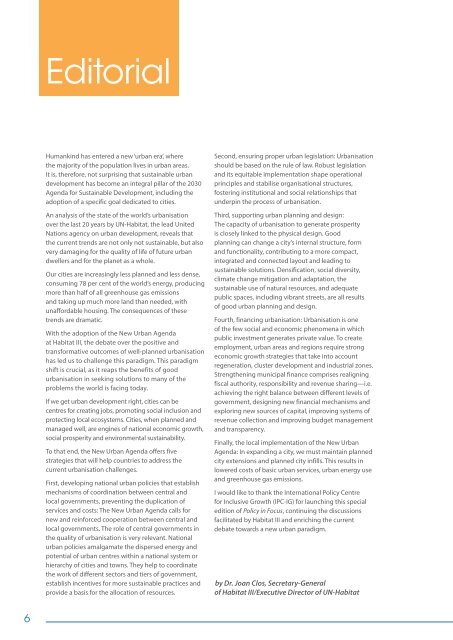A new urban paradigm pathways to sustainable development
PiF37
PiF37
Create successful ePaper yourself
Turn your PDF publications into a flip-book with our unique Google optimized e-Paper software.
Edi<strong>to</strong>rial<br />
Humankind has entered a <strong>new</strong> ‘<strong>urban</strong> era’, where<br />
the majority of the population lives in <strong>urban</strong> areas.<br />
It is, therefore, not surprising that <strong>sustainable</strong> <strong>urban</strong><br />
<strong>development</strong> has become an integral pillar of the 2030<br />
Agenda for Sustainable Development, including the<br />
adoption of a specific goal dedicated <strong>to</strong> cities.<br />
An analysis of the state of the world’s <strong>urban</strong>isation<br />
over the last 20 years by UN-Habitat, the lead United<br />
Nations agency on <strong>urban</strong> <strong>development</strong>, reveals that<br />
the current trends are not only not <strong>sustainable</strong>, but also<br />
very damaging for the quality of life of future <strong>urban</strong><br />
dwellers and for the planet as a whole.<br />
Our cities are increasingly less planned and less dense,<br />
consuming 78 per cent of the world’s energy, producing<br />
more than half of all greenhouse gas emissions<br />
and taking up much more land than needed, with<br />
unaffordable housing. The consequences of these<br />
trends are dramatic.<br />
With the adoption of the New Urban Agenda<br />
at Habitat III, the debate over the positive and<br />
transformative outcomes of well-planned <strong>urban</strong>isation<br />
has led us <strong>to</strong> challenge this <strong>paradigm</strong>. This <strong>paradigm</strong><br />
shift is crucial, as it reaps the benefits of good<br />
<strong>urban</strong>isation in seeking solutions <strong>to</strong> many of the<br />
problems the world is facing <strong>to</strong>day.<br />
If we get <strong>urban</strong> <strong>development</strong> right, cities can be<br />
centres for creating jobs, promoting social inclusion and<br />
protecting local ecosystems. Cities, when planned and<br />
managed well, are engines of national economic growth,<br />
social prosperity and environmental sustainability.<br />
To that end, the New Urban Agenda offers five<br />
strategies that will help countries <strong>to</strong> address the<br />
current <strong>urban</strong>isation challenges.<br />
First, developing national <strong>urban</strong> policies that establish<br />
mechanisms of coordination between central and<br />
local governments, preventing the duplication of<br />
services and costs: The New Urban Agenda calls for<br />
<strong>new</strong> and reinforced cooperation between central and<br />
local governments. The role of central governments in<br />
the quality of <strong>urban</strong>isation is very relevant. National<br />
<strong>urban</strong> policies amalgamate the dispersed energy and<br />
potential of <strong>urban</strong> centres within a national system or<br />
hierarchy of cities and <strong>to</strong>wns. They help <strong>to</strong> coordinate<br />
the work of different sec<strong>to</strong>rs and tiers of government,<br />
establish incentives for more <strong>sustainable</strong> practices and<br />
provide a basis for the allocation of resources.<br />
Second, ensuring proper <strong>urban</strong> legislation: Urbanisation<br />
should be based on the rule of law. Robust legislation<br />
and its equitable implementation shape operational<br />
principles and stabilise organisational structures,<br />
fostering institutional and social relationships that<br />
underpin the process of <strong>urban</strong>isation.<br />
Third, supporting <strong>urban</strong> planning and design:<br />
The capacity of <strong>urban</strong>isation <strong>to</strong> generate prosperity<br />
is closely linked <strong>to</strong> the physical design. Good<br />
planning can change a city’s internal structure, form<br />
and functionality, contributing <strong>to</strong> a more compact,<br />
integrated and connected layout and leading <strong>to</strong><br />
<strong>sustainable</strong> solutions. Densification, social diversity,<br />
climate change mitigation and adaptation, the<br />
<strong>sustainable</strong> use of natural resources, and adequate<br />
public spaces, including vibrant streets, are all results<br />
of good <strong>urban</strong> planning and design.<br />
Fourth, financing <strong>urban</strong>isation: Urbanisation is one<br />
of the few social and economic phenomena in which<br />
public investment generates private value. To create<br />
employment, <strong>urban</strong> areas and regions require strong<br />
economic growth strategies that take in<strong>to</strong> account<br />
regeneration, cluster <strong>development</strong> and industrial zones.<br />
Strengthening municipal finance comprises realigning<br />
fiscal authority, responsibility and revenue sharing—i.e.<br />
achieving the right balance between different levels of<br />
government, designing <strong>new</strong> financial mechanisms and<br />
exploring <strong>new</strong> sources of capital, improving systems of<br />
revenue collection and improving budget management<br />
and transparency.<br />
Finally, the local implementation of the New Urban<br />
Agenda: In expanding a city, we must maintain planned<br />
city extensions and planned city infills. This results in<br />
lowered costs of basic <strong>urban</strong> services, <strong>urban</strong> energy use<br />
and greenhouse gas emissions.<br />
I would like <strong>to</strong> thank the International Policy Centre<br />
for Inclusive Growth (IPC-IG) for launching this special<br />
edition of Policy in Focus, continuing the discussions<br />
facilitated by Habitat III and enriching the current<br />
debate <strong>to</strong>wards a <strong>new</strong> <strong>urban</strong> <strong>paradigm</strong>.<br />
by Dr. Joan Clos, Secretary-General<br />
of Habitat III/Executive Direc<strong>to</strong>r of UN-Habitat<br />
6


